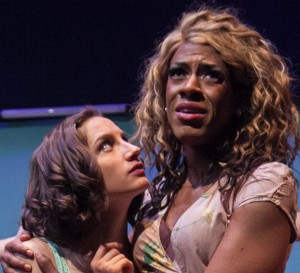Darren and Janet are the typical white couple, living typical middle-class lives, and waiting for their baby to arrive. Will it be a girl? Will it be a boy? What the couple was not expecting was for the baby to be, well, both.
Explaining gender and sex with an interesting twist, Happily After Ever is a pleasant way to begin a conversation about a hot-button issue. The play begins with Darren (Jeffrey Brian Adams) and Janet (Molly-Ann Nordin) meeting for the first time at a bus stop. “It’s so endearing and not at all coincidental that we happen to be two such attractive, single people sitting next to each other and waiting for a bus that won’t come,” Janet says as the two sit on a bus bench in the rain. And as quickly as their conversation started, the two become married, and suddenly Janet is pregnant—all within about 10 minutes. This lighthearted, rom-com scenario of falling in love at first sight quickly changes when the couple finds out that their baby is intersex. The happy-go-lucky couple is then stuck with the tough decision—what sex should the baby be?
The intersex baby becomes the “odd cookie out” in this cookie-cutter world, leaving Darren and Janet to figure out how to balance their love for their new bundle of joy with their fear of raising a child that is not like everyone else. For the rest of the play, the audience sees into the couple’s home and listens in on their conversations around what sex their baby should be. In addition to their baby’s sex, the couple comments on the way they act and how it is heavily influenced on their gender. With satirical humor drenched in almost every line, the conversations between the couple are upbeat and often produce chuckles.
To add pressure to these new parents, their neighbors, Jerry (Brennan Lowery) and Dharma (Marlon Meikle), come over every week for game night. This odd couple are the typical judgmental neighbors. They add to the satirical humor and outwardly judge themselves and their neighbors’ lives. Although they are jealous that the younger couple have a baby, their dissatisfaction of a baby being more than one sex increases the fear in Darren and Janet’s already distraught minds. Even their talking dog Tommy (Jim Anderson) can smell the sadness on Janet.
In a desperate need to go back to normal, the couple tries different ways to cope with their situation. They even try to ignore their infant:
Darren: I can’t think, Janet. It’s like there’s a noise that won’t go away…. It’s almost like…
Janet: A baby.
Darren: Not quite. Although now that you mention it…
Janet: It’s the baby, Darren.
Darren: Right. The baby.
Obviously this tactic does not work. Their distress escalates to a point where by the end of the play, Darren and Janet have to choose the baby’s sex. Will they choose a boy? Will they choose a girl? Or will they choose to leave the baby as it is and be both?
Sitting in an intimate theater, the audience will get a chance to laugh at the absurdity of the way gender is perceived through the eyes of two typical newlyweds with an atypical child. But in focusing on white middle-class adults, Zlatos steers away from delving into the experience of intersex people. Instead, she focuses the humor on the people who are not intersex.
Costume designer Stephanie Levin helps to amplify these gender perceptions in costumes that reflect both femininity and masculinity. With a cute polka-dot dress for Janet and a fitted shirt and trousers for Darren, the couple is picture-perfect for any Friday night game night with the neighbors. To add to the contrast of female and male on stage, set designer Rebecca Lord-Surratt paints the stage with baby blue walls and hot pink floors, diagonally divided by a suburban green lawn. The set pieces are great for quick transitions and easily transform to the appropriate piece furniture during each scene, while the lights designed by Megan Dallas Estes give the set a crisp, clean sitcom feel. They fit perfectly in this quirky, perky look at gender issues.
Director Sherri Eden keeps up the quickly paced dialogue. The chemistry between Janet and Darren is a little more believable than the chemistry between Dharma and Jerry—however, both fall a bit flat. Their relationships lack a passion and connection with each other that makes their interactions with their significant others less interesting and exciting to watch. However, the overall performances of the actors are engaging and keep the audience giggling throughout.
Happily After Ever is an enjoyable show with easy and lighthearted jokes. Shining light on the daily life of a struggling couple, their neighbors, and a talking dog helps the audience become aware how gender and sex heavily influence the way people think and act.
Happily After Ever runs until April 16 at 59E59 Theaters (59 East 59th St. between Park and Madison avenues) in Manhattan. Evening performances are at 7:30 p.m. Tuesday through Thursday and at 8:30 p.m. Friday and Saturday; matinees are at 3:30 pm. on Sundays. Tickets are $18. To purchase tickets, call Ticket Central at (212) 279-4200 or go to www.59e59.org.



